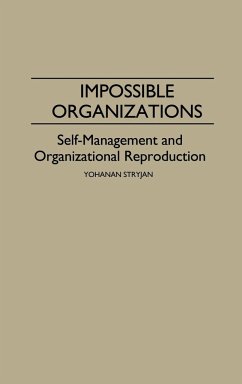Stryjan's notable study outlines a new theoretical perspective on self-managed organizations, which is also of considerable interest to students of conventional organizations. The work describes the functioning of, and the preconditions for, successful self-management and its reproduction. Examples deal primarily with worker cooperatives and, to a lesser extent, with worker-owned enterprises and Israeli kibbutzism. All three organizational types have clear, formally defined bodies of members who take part, actually or potentially, in making and implementing their organizations' decisions. Stryjan's perception is that, in this instance, theory-making should best proceed from organizational practices as they are applied in such organizations. The theoretical perspective he outlines is derived from a literal interpretation of the democratic model and assumes that superiors in self-managed organizations reside at the bottom, and have a permanent, hands-on commitment to shaping their organization. This is the starting point for a striking theoretical synthesis of elements taken from a variety of research traditions. The comprehensive introductory chapter provides a sound basis for the study, and the theoretical groundwork is laid for outlining a model organization capable of accommodating and being directed by what its members do. Chapter 2 surveys the limitations of the concept of worker ownership, and suggests a concept of membership as a more suitable core concept for a theory of self-management. Subsequent chapters review available theoretical tools within organizational research that can be of use in dealing with links between individuals and organizations, and between organizations and their environment. A simple static model of organizational reproduction in a formally democratic organization with stable membership is presented first. Stryjan gradually expands this model to accommodate implementation failures, dissent and conflict, demographic deterioration and regeneration. The task of refining the theoretical model to approximate reality-based scenarios is completed in a thorough discussion of the self-managed organization's interaction with its environment. Impossible Organizations is a distinguished and thought-provoking contribution to sociological literature; it will prove essential for students and researchers of organizations in general and of self-managed organizations in particular.
Hinweis: Dieser Artikel kann nur an eine deutsche Lieferadresse ausgeliefert werden.
Hinweis: Dieser Artikel kann nur an eine deutsche Lieferadresse ausgeliefert werden.








